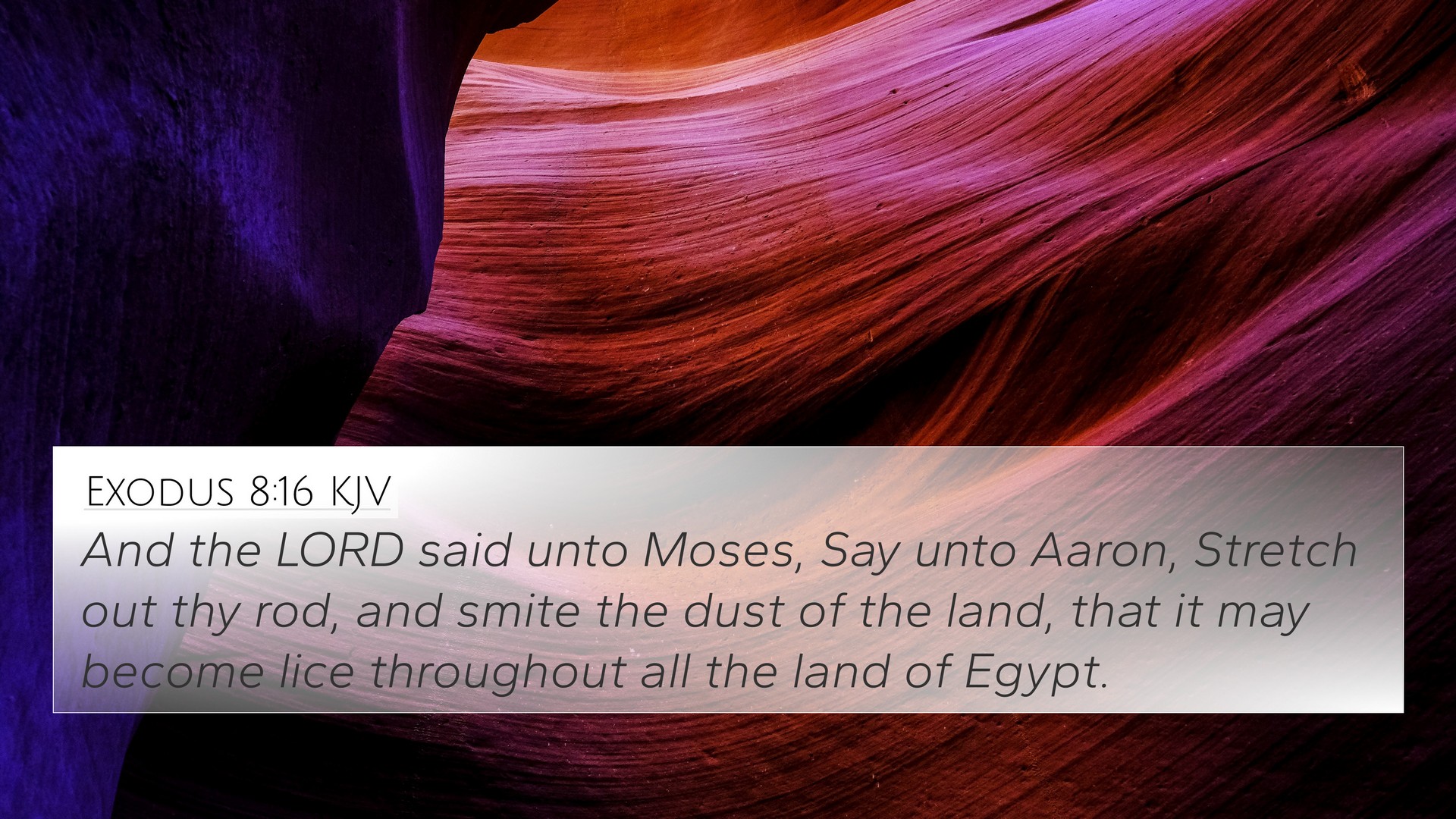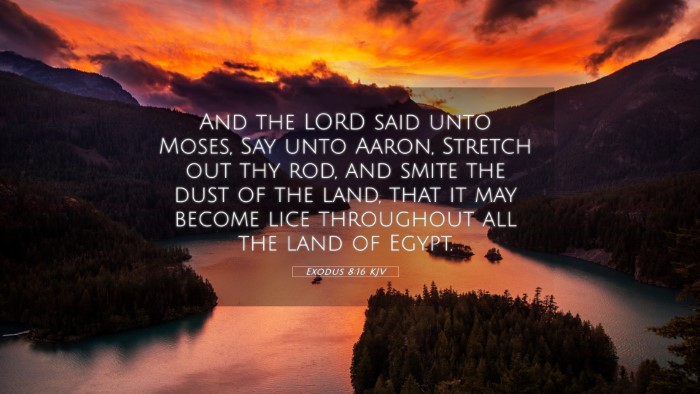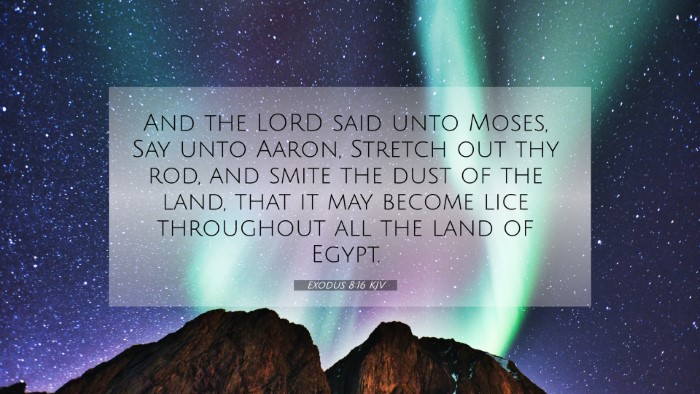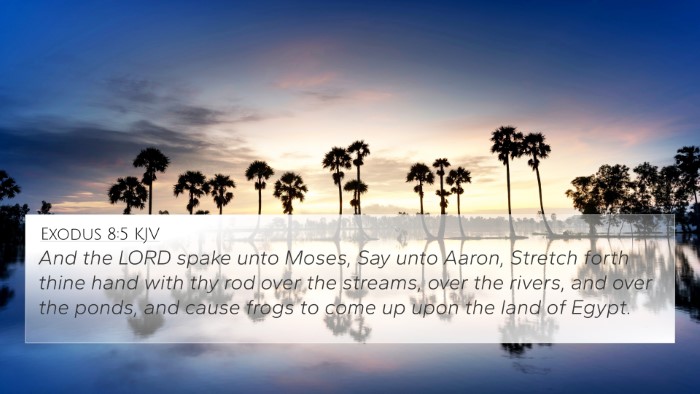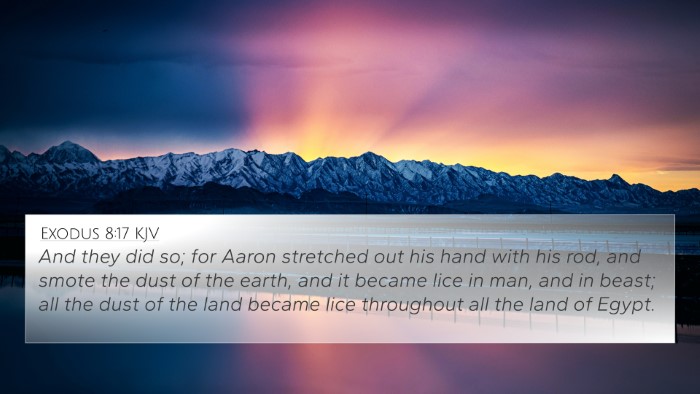Interpretation of Exodus 8:16
Bible Verse: Exodus 8:16 - "And the LORD said unto Moses, Say unto Aaron, Stretch out thy rod, and smite the dust of the land, that it may become lice throughout all the land of Egypt."
This verse marks a significant moment in the narrative of the plagues upon Egypt, showcasing God's authority over creation and the unfolding judgment upon Pharaoh for his refusal to heed God's commands. Here, God instructs Moses to command Aaron to strike the dust of the land, resulting in lice—a direct assault on the Egyptian deities associated with the earth and fertility.
Summary of Commentaries
Matthew Henry's Commentary
Matthew Henry emphasizes that this plague symbolizes the futility of relying on false gods of Egypt, as God demonstrates His power over even the most insignificant elements of creation. The lice, emerging from the dust, highlights how God can turn the most benign aspects of nature into instruments of judgment. Henry notes that this event also serves as an invitation for the Israelites to witness God's might and encourages them to trust in Him.
Albert Barnes' Notes
Albert Barnes states that the act of smiting the dust signifies the humiliation of Egypt, as the lice infests people and animals alike. He argues that this plague, unlike previous ones, was so extensive that even the magicians of Pharaoh were unable to replicate it, acknowledging it as the "finger of God." This transition reflects the deepening severity of the judgments upon Egypt and serves as a warning to Pharaoh about the consequences of continued disobedience.
Adam Clarke's Commentary
Adam Clarke contextualizes the scene, noting that lice are typically seen as unclean. The striking of dust conveys a sense of God's thorough judgment upon every aspect of Egyptian life, symbolizing a broader spiritual uncleanness. Clarke points to the notion that God’s commandments extend to even the dust, representing His sovereignty over all creation and the attention He gives to the smallest of details in instilling a moral order.
Cross-References
This verse can be tied to several other Bible verses that illustrate thematic connections or similar events:
- Exodus 7:14-25 - The first plague of blood, demonstrating God's power over nature and the Nile, which Egyptians revered.
- Exodus 8:1-2 - The initial call for Pharaoh to let Israel go, indicating the continuity of God's demand for obedience.
- Psalm 105:29 - A reflection on God's wonders in Egypt, specifically linked to the plagues as acts of divine intervention.
- Romans 9:17 - Paul references Pharaoh's hard heart and God's purpose in showing His power over nations.
- Revelation 16:12-21 - The pouring out of plagues in the eschatological context, paralleling the Exodus experience.
- Matthew 10:30 - The hairs on our heads are counted, emphasizing God's intimate care for creation.
- Job 4:19 - The focus on our fragility in contrast to God's might; even dust is significant to Him.
Thematic Connections Between Bible Verses
The concept of using dust or elements that humans deem insignificant as means of divine judgment is a recurring theme in the Bible:
- Genesis 2:7 - God formed man from the dust of the ground, showing the divine potential in what is lowly.
- Isaiah 40:6 - The transience of humanity contrasted with God's eternal nature, underscoring the insignificance of human arrangements.
Conclusion
Exodus 8:16 serves as a crucial turn in God’s confrontation with Pharaoh, illustrating sovereignty over creation and calling attention to the seriousness of Pharaoh's disobedience. As seen through the eyes of different commentators, it provokes reflection on the themes of judgment, humility, and divine authority. When conducting a Bible cross-reference guide or engaging in cross-referencing Bible study, exploring Exodus 8:16 through these various lenses enriches our understanding of God's word, revealing the profound interconnectedness of Scripture.
